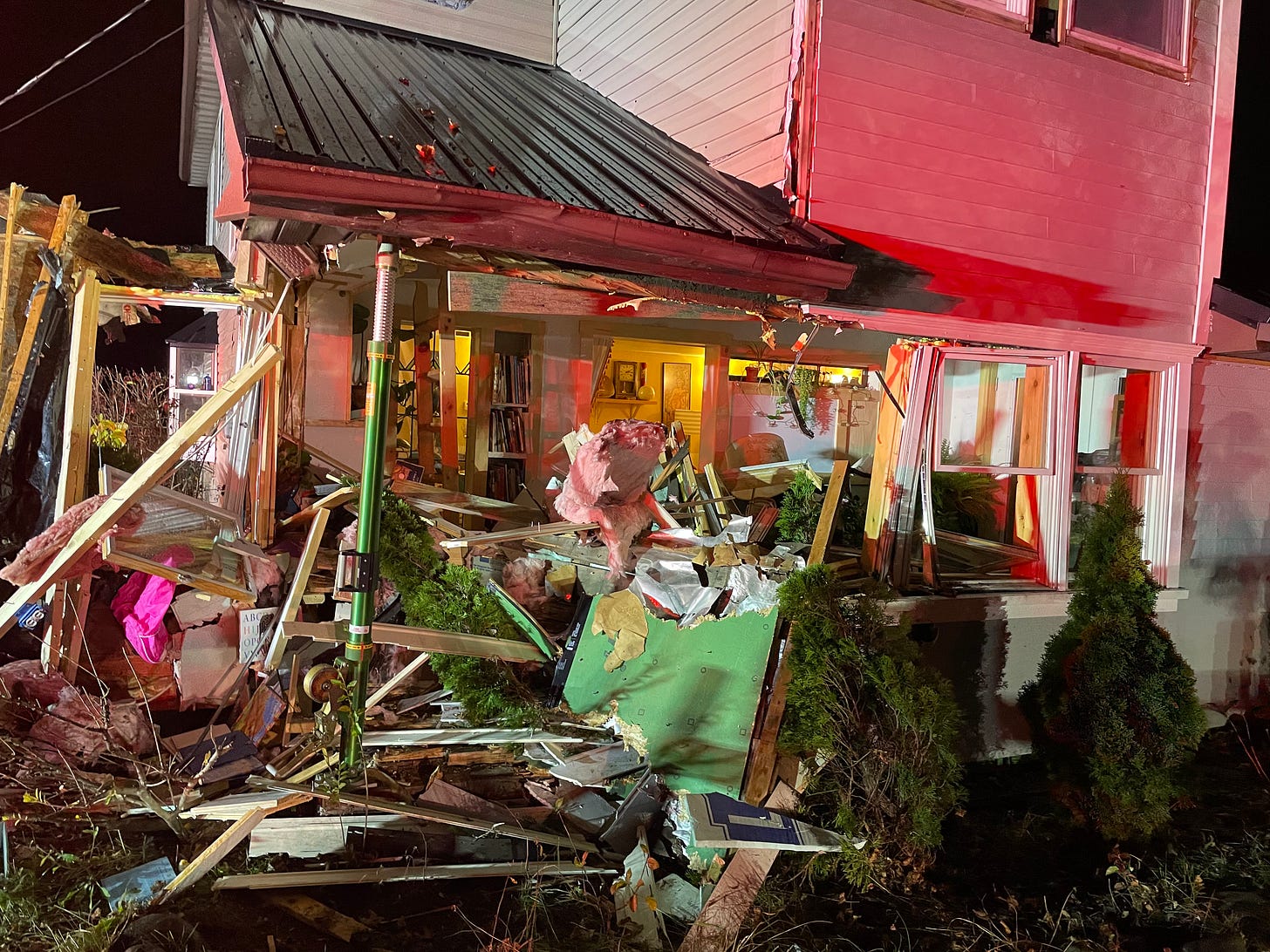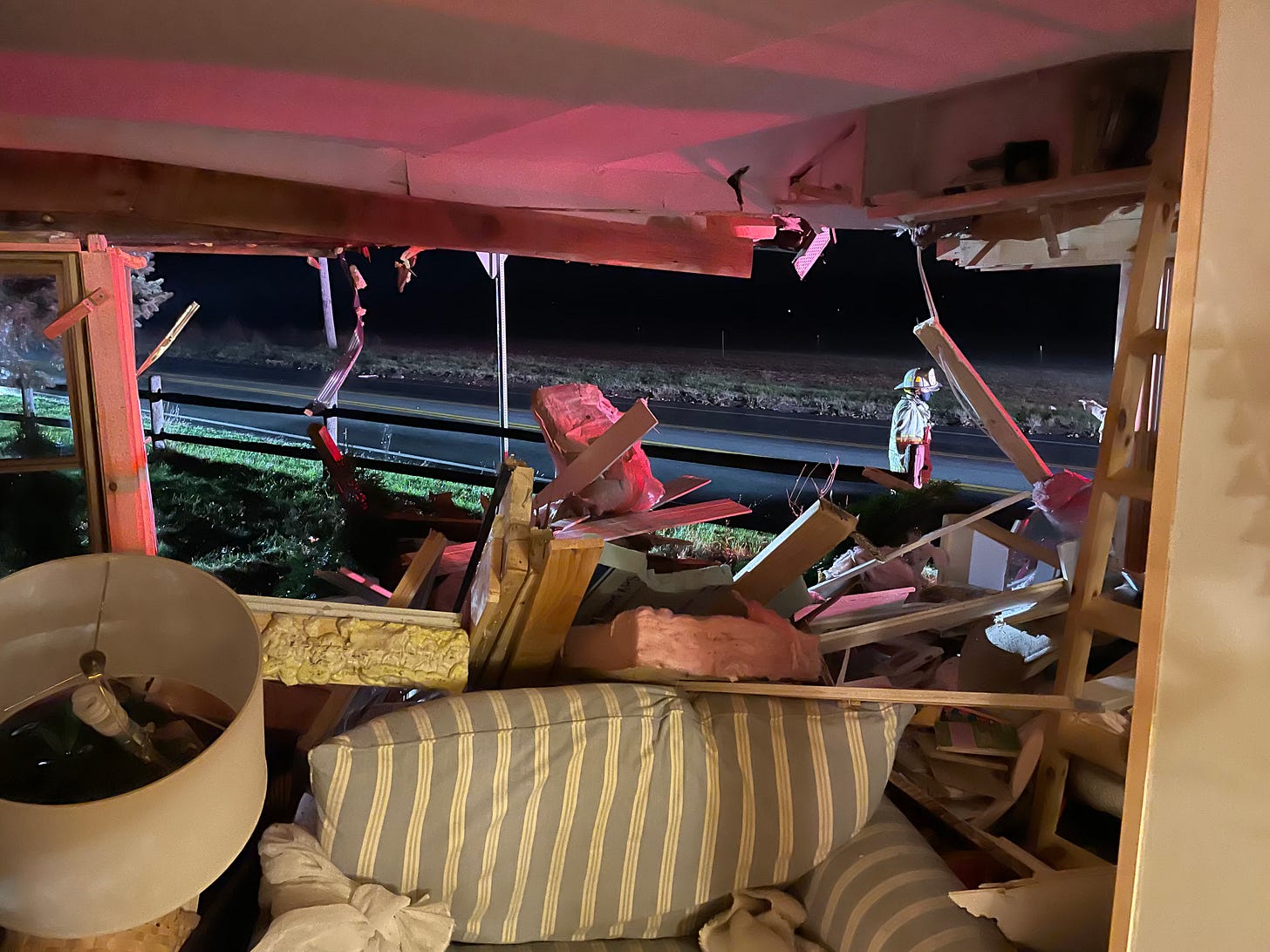Picking Up the Pieces
Wanton Destruction, Anger, Grief, and Rebuilding
In November 2020, a car drove through our house.
My husband and I woke at 5am to what sounded like a bomb going off. After checking on the kids, we sprinted downstairs to find that 1/4 of our downstairs was gone.
A Jeep had driven headfirst into our home and then taken a hard left to end up back in the road, totaled. It took with it the entire southwest corner of our home, which also happened to be an entire summer’s renovation work on our children’s playroom and three months of my husband’s blood, sweat, and tears.
I stood in the living room, looking straight into the outdoors. The man who drove through our house stood in horrified awe of the disaster he had made of our lives. Our eyes met across the wreckage. As his eyes swept back over what he had done, he looked back at me and said, “I don’t know what to say. I’m so sorry.”
I looked at our missing wall, our ruined furniture, our traumatized dog, my children’s toys covered in insulation and shrapnel from the windows, my shattered and uprooted houseplants that had just the day before basked in the sun from the wall of windows my husband had just installed, and our children’s books, flopped open in the yard, soaking rain into the well-thumbed pages.
Almost none of it was salvageable. With an exhausted shrug I said “I guess I’m just glad you’re ok.” And we both knew there wasn’t much more to be said. I didn’t try to put much warmth into it, but it was true.
It was true at the exact same time that it was also true that I was furious at him. His momentary carelessness would cost us months - if not years - of rebuilding. He had destroyed an entire summer of my husband’s careful craftsmanship. Our children and dog were terrified. He would walk away that day, maybe feeling a little guilt, but otherwise unscathed, while our lives at least for a while were fundamentally transformed.
But I didn’t have (much) time or energy for anger.
When you’re missing a large chunk of your home on a blustery November morning, there’s some basic triage you have to do. Is everyone safe? Will the second story collapse into the first? How do we protect the stuff we have left?
There’s anger and grief, but also the basic reality that there are things that need to get done. Our dog was in her crate in the room he drove through. Miraculously she was pushed 10ft across the floor. We dug her out from under the debris and got her covered up and safe.
While the fire personnel jacked up the corner of our house I wandered around picking up books from the yard while my husband called the insurance company. We weren’t allowed in the playroom because of structural concerns, so we peered at the wreckage from the outside (now the same as the inside), trying to assess whether there was anything priceless that we really needed to access.
That morning was a bit of a blur, but once we were sure the house wasn’t going to collapse and the emergency construction crew got plywood in place to keep the rain out of what was left, we tried to figure out next steps.
Plans were made. Things happened. We took steps forward, in between shared swearing sessions.
My in-laws or my parents (maybe both?) took our three kids for the week. My office on the second floor was inaccessible for a week - the fire marshal wasn’t sure the entire second floor wasn’t going to collapse - so I tried to make a list of what I would need to move from there to my office at work. Our next-door neighbors brought over pots for us to replant the plants that had survived. Others brought wine and beer and casseroles. We started a list of everything that was lost while also working to find contractors available in the middle of a pandemic. The insurance company sent someone to assess the foundation for structural damage. The fire marshal and other fire personnel stomped through the house, apologetically bringing in the November rain and mud.
In the years that followed, we battled incompetent contractors, skyrocketing construction prices, innumerable COVID delays, and wrangling with our otherwise excellent insurance company about things like how to match the existing siding given that it no longer existed. Four years later, we still have a handful of residual tasks, mostly due to contractor issues. It has been a long and exhausting road.
Lessons for a Rough Election
How does our small-scale calamity relate to the election last week?
What Trump is doing with his cabinet picks is a lot like driving a Jeep through the federal government. Assuming the Senate confirms even most of his picks, a lot will be damaged and a lot will be lost. A lot of people will suffer.
If Trump is like the Jeep that smashed into our house, it will be a long road of rebuilding. It will be complicated.
In my family’s microcosm of destruction, despite having to navigate insurance bureaucracy and inept and incompetent contractors, we didn't have to navigate and negotiate with all the other interest groups and complexities that characterize American government. The silver lining of our car crash disaster is that we were able to bump out the second story into a full floor, which gave us enough room to add a master bathroom, which we’re in mid-build on right now.
This silver lining doesn’t mean it was worth it. I’m not sure what that would means, anyway. You don’t always get to choose the tradeoffs you face in life.
The entire experience was scary and heartbreaking and exhausting. But what it does mean is that if you are thoughtful about rebuilding and don’t let your anger get in the way of doing what needs to be done, you can end up in a slightly better place than you were before a Jeep drove through your house.
Some things my husband and I focused on that may or may not be helpful for other people post-election.
We didn’t let our anger take over. To be clear, we were angry. In my husband’s case, that anger was compounded by grief. He was almost heartbroken, given that he had just spent three months lovingly renovating that space. There was a mourning period. But we still plowed ahead while angry and mourning because shit needed to get done.
We didn’t blame the wrong people. Yes, idiot guy deserved a lot of our blame. But the broader problem was a structural one - back in the 80s the state had moved the road from one side of our house to another, leaving our house dangerously exposed to any distracted driver.
I also don’t think anything would have been accomplished by trying to destroy idiot guy’s life in return. He made a split second mistake that cost us a lot. But sometimes that’s what happens in human social life. I will blame Trump because he differs from idiot Jeep driver in fundamental ways. He’s had plenty of time to reconsider his driving habits (if we’re going to keep this metaphor going). But some if not many Trump voters were very much like Jeep guy: making split second decisions to read a text or drift off to sleep, not realizing how decisive those decisions would end up being.
We took care of each other. My husband and I both worked to ensure a sense of normalcy for our kids even as we juggled the addition of another full-time job on top of our already crazy lives. We tried to make space for each other, traded off the worst parts of the process, and tried to get excited about rebuilding (some days harder than others).
We re-discovered our community. We have wonderful neighbors and a loving family. Our neighbors and our family bonded over this experience. I realized how many people would show up when things got rough. People from across town advocated on our behalf with the town and county about road safety, our neighbors took our kids for many an afternoon playdate while we struggled with contractor drama or meetings with the insurance company, and our parents took the kids for sleepovers so we could have some rare time together that didn’t involve questions about structural damage. Our people showed up for us. I hope we would do the same for others too.
We built protective barriers. In the hopes of disincentivizing distracted drivers or at least protecting our family, we spent around $10,000 out of pocket on boulders and landscaping. It won’t stop someone driving at full speed in a large truck, but it’ll do something. I’m not entirely sure what this would look like at the national level, but lots of thoughtful people are working on it.
We rebuilt thoughtfully. When it came time to rebuild, rather than just replicate what was there before, we brought in an architect and got some plans to bump out the second story of our small house. We didn’t exactly know what we would do with that space, but we had some ideas. And we knew that if you’re going to think about big renovations you might as well do it after someone has driven a Jeep through your house.
It sounds trite and maybe even a little simplistic, but sometimes things really do have to get worse before they can get better. Sometimes we have to tear things down or even have them destroyed - even against our will - before we can build a better place.
But there’s still that possibility to make things better, even after deep destruction.
I’m looking at the next four years as a time to roll up my sleeves, figure out how to use my voice, and how to think about rebuilding once the dust settles. We can be angry and grief-stricken and we can mourn if that’s how we feel, but we also have to keep going. We have to pick up the pieces and nail plywood over the windows to protect the things we care about most.
The silver lining we found does not mean that the guy who drove through our house did us any favors. He was simply a reckless idiot and he was very lucky he didn’t kill our kids or himself or one of the joggers or cyclists that frequent our roads. He was an incompetent idiot, not a thoughtful deconstructor. And his incompetence didn’t mean he also wasn’t dangerous. He deserves no credit in this story. And, to be clear, neither does Trump.
A car crashing into our house isn’t the perfect metaphor for the Trump administration, but it’s not a terrible one either.
We have choices about what we do next. We have agency. We get - in some small way - to decide. If not the fate of our country, how we show up to one another in the coming days. How we pick up the pieces, how we cooperate to make each others’s lives easier, and the kinds of things we refuse to compromise on.
It was an exhausting four years for us. And now we face another exhausting four years as a nation. But as I’ve been stressing over the last week, we do get - in some small way - to choose how things look in the future.
As always, let me know what you think! Leave a comment, subscribe and - please! - if you like what you read, share (and recommend if you’re on Substack)! That’s the number one way readers find my work.





Wow! What an ordeal. And yes, I do see where you're going with this metaphor...